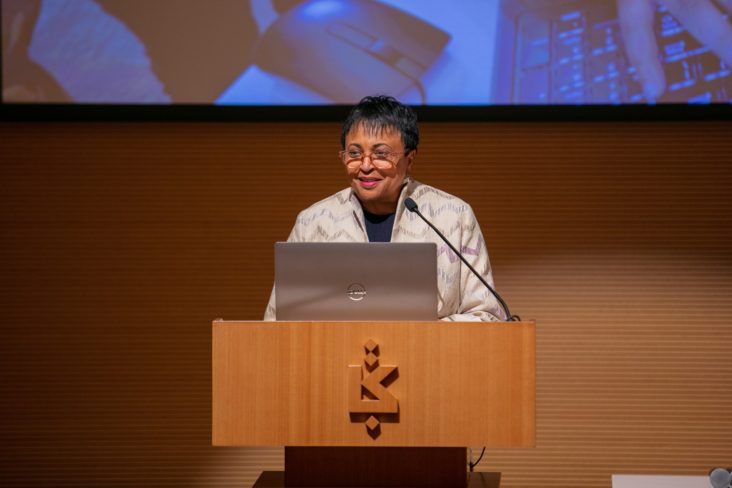Two-Day National Libraries Summit Begins In Sharjah With 50 Library Directors From 20 Nations Committing To Stronger Global Collaboration

More than 50 national library directors and senior staff from 20 countries in Europe, North America, Africa and the MENA region have come together to underline their commitment to innovation and adaptation to enrich their communities at the two-day National Libraries Summit, which begun today (Monday, November 8) at the Sharjah Book Authority (SBA) HQ in conjunction with the 40th Sharjah International Book Fair (SIBF 2021).
Organised by SBA under the theme, ‘Visibility, Engagement, Impact, and Collaboration’, the opening day of the summit enabled peer-to-peer networking and sharing of expertise through talks that addressed key issues impacting national libraries worldwide. Participants also exchanged best practices and new approaches in national library curation, and discussed stronger international collaboration.
The opening day of the Summit was attended by HE Ahmed bin Rakkad Al Ameri, Chairman of SBA; Dr. Carla Hayden, Librarian of Congress, U.S.A.,Marie de Laubier, Director of Collections, Bibliothèque nationale de France (BnF); and Dr. Hassan A. Alsereihy, President of the Arab Federation for Libraries and Information (AFLI).
In a keynote address, HE Ahmed bin Rakkad Al Ameri, Chairman of SBA, said: “Under the guidance of His Highness Sheikh Dr. Sultan bin Muhammad Al Qasimi, Member of the Supreme Council and Ruler of Sharjah, investments in knowledge, books and culture are steering progress in the emirate and enhancing human capacities. At the heart of this cultural project are the libraries, which are the gateways to knowledge in all forms.”
He added: “Organising the National Libraries Summit aligns with our goal to preserve and boost the vital cultural role of national libraries and restore their social status in our communities. This summit reinforces our commitment to sharing best practices and leveraging modern technology to stay efficient and relevant.”
Michael Dowling, Director, International Relations Office, Chapter Relations Office at American Library Association (ALA) welcomed participants to the summit.
Pivoting during the pandemic
First day discussions opened with a session on ‘National Library Visibility in Society’, which explored how these institutions, badly struck by the pandemic, are working towards getting their users back.
Marie de Laubier, Director of Collections, Bibliothèque nationale de France (BnF), explained that although BnF had substantial pre-existing remote services including a repository of 8.6 million digital documents,Covid-19 accelerated its transformation to becoming a more agile institution. She said: “We responded to challenges by creating new content and formats, offered live presentations and virtual professional training, launched remote access to e-resources and extended the services to everyone – not only researchers.”
“The challenge now lies in maintaining the physical link with our readers and visitors and bringing them back into the reading rooms,” she added.
Nassar S. Abulabqah, Manager, Information Service and Digital Library, National Library of Kuwait, outlined how the knowledge crisis that surfaced during Covid-19 led to a quick shift to e-services to fulfil the library’s goal of making all formats of resources available to users. His colleague, Ghadeer Al-Ajmi, Director of the National Archives, elaborated that this transformation was supplemented by obtaining copyrights from publishers to expand resources for readers in the digital format and ensure continuity of services.
She added that the launch of a WhatsApp service to communicate with users was the most effective strategy in drawing a larger number of users to the digitised offerings of the library.
Boosting digital engagement
At a session that focused on ‘Engaging Digital Users’, Dr. Carla Hayden, Librarian of Congress, U.S.A., said: “Libraries worldwide have a collective mission – to reach and serve people who need information and can be enriched by the resources and services we provide.”
Although the Library of Congress has had a digital-forward strategy in place for several years, a series of initiatives launched during the pandemic such as crowdsourcing digital collections and an ‘Innovators in Residence’ programme to foster experimentation with its digital collection have helped enhance services, optimise resources, and bridge gaps, she said.
Dr. Hayden added that the increased engagement with users, including researchers and teachers, and the extensive expansion of e-resources have led to a more than 50 percent increase in online visits last year, reinforcing the huge appetite for digital content.
“We are living in a new normal; there is no going back,” stated the Librarian of Congress, adding that the institution’s 2022-26 plan emphasises a shift to a digital collection strategy. “The future is increasingly digital and our focus on mainstreaming digital collections’ workflows will mark the shift toward e-preferred for many formats,” she added.
Dr. Sandra Collins, Director, National Library of Ireland, said: “It is true that Covid-19 turned our world upside down, but it also helped us build on the work we had already invested into prioritising our digitisation efforts. Our investments in digital infrastructure, underlined with the spirit of innovation and strong commitment to public engagement, led us through a very challenging period.”
Katherine McSharry, Deputy Director, shared with participants how some of the digital initiatives embraced during the pandemic enabled the Irish institution to expand the audience base and engage better with educational institutions and the Irish community around the world in ways that was not possible before.
Tomorrow (Tuesday), Huism Tan, Executive Director at the Qatar National Library, will focus on the theme of ‘Impact’ while Kepi Madumo, National Librarian and CEO, National Library of South Africa, and Dr. Anna Chulyan, Director, National Library of Armenia, will touch upon the theme of ‘Collaboration’.
The National Libraries Summit is being held in advance of the 8th Sharjah International Library Conference, which is organised each year by SBA, the American Library Association. Joining these organisers as co-sponsors and contributors to the summit are IFLA’s National Libraries Section and the Arab Federation of Libraries and Information (AFLI).



